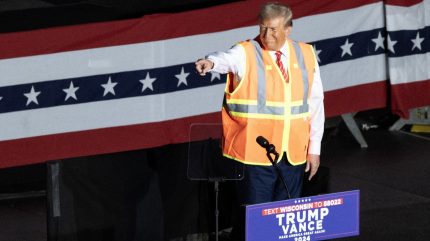
The modern world – the modern business world in particular – hates uncertainty. As I write this, the US presidential race stands upon the edge of a knife – and the slightest waft of a breeze (manifesting itself, for instance, in the ill-advised use of a word like ‘garbage’) could tip the balance. Fascinating but, almost regardless of your allegiances, potentially slightly terrifying.
If President Trump wins a second term in the White House, quite a lot of ink has been devoted to trying to divine what on Earth he might do once in office. The scarcely veiled threat to want to settle old scores has some worried – and you can count among that number multinational beverage-alcohol businesses that depend on the US for a sizeable chunk of their revenues and profits.
This is the scenario that prompted an intriguing analyst note from Bernstein, which revived Trump’s self-appointed sobriquet of ‘Tariff Man’, and referenced his avowed intent to impose a blanket 10% tariff on all imports into the US, alongside a potential 60% (!) tariff on imports from China. Mexico, too, might come in for some extra punishment, thanks to its bilateral trade deficit with the US – and the impact on the already cooling Tequila boom could be sobering.
Some of the other conclusions to be drawn from this are equally obvious. The more business you do in the US, the more exposed you are to this tariff threat, assuming you import all or most of your products. If you don’t sell much in the US – and the beverage alcohol big-hitter list here, barring some of the brewers, is thin – then you’ll be ok. And if you sell domestically produced stuff (beer, Bourbon, vodka, etc), then you’ll also be ok. Well, maybe. We’ll get to that later.
Bernstein’s potential losers include Constellation Brands, which not only derives nearly all of its revenues from the US but also has to import an awful lot of its product, chiefly beer from Mexico. Others with a potential problem include Rémy Cointreau (Cognac), Diageo (Scotch, Tequila) and, to a lesser extent, Campari (aided by Wild Turkey and Skyy, both US-made) and Pernod Ricard (more weighted to Asia). I’d add Moët Hennessy to that list as well.
Clearly, products with a legally enforced, designated place of origin are vulnerable here. That means Scotch, Irish and other whiskies in particular (especially given the competition offered by Bourbon and other US whiskies), as well as Cognac, Champagne, Tequila… you get the picture.

US Tariffs are shifting - will you react or anticipate?
Don’t let policy changes catch you off guard. Stay proactive with real-time data and expert analysis.
By GlobalDataOk, so assuming all of this comes to pass, what should companies do about it? Here I pity the Bernstein number crunchers because this is where it gets a bit complicated. Depending on how the tariffs are applied, the price increases necessary to absorb the extra costs might be less than expected – 4.5% is the figure mentioned.
Given the stresses that have afflicted the US over the past year or two, trying to push forward a 4.5% price increase sounds a bit ambitious.
Doesn’t sound too bad? Well… Given the stresses that have afflicted the US market over the past year or two, trying to push forward a 4.5% price increase sounds a bit ambitious to me. Look at Cognac, for example. We’ve had scarcity driving price hikes, then sales falling off a cliff, followed by the sector’s biggest player (Hennessy) slashing prices to shift cases. Adding in a tariff-inspired increase to that scenario doesn’t sound like the greatest play ever.
The Bernstein note, of course, also makes play of the relative winners here: Anheuser-Busch InBev and Molson Coors among the brewers, Brown-Forman among the spirits producers – these are the guys sitting pretty when Tariff Man returns, right? Wrong. Because Trump’s tariff beanfeast – if and when it happens – will prompt an international reaction.
China, the UK, the EU, possibly Mexico – does anyone seriously believe that they will sit on their hands while all this happens? Trump is far from being the only Tariff Man in town – ask Australian wine producers about the years of lost sales in China; ask Bourbon brands about their own battles against punitive taxes in the EU and elsewhere. Ask the Cognac houses about what they’re facing in China right now.
Brand owners might look at this, think back to what happened the last time Trump won the presidency, and decide to try to ride out the storm. After all, this time we know that it’s at most a single term – and last time, when Biden won, those tariffs were dismantled pretty quickly.
That’s the glass half-full spin. The other, altogether more troubling scenario is that – almost regardless of Trump – what we’re seeing is the gradual return of a more protectionist trading environment around the world, acting as a rejoinder to decades of free-market thinking and globalisation.
This Hallowe’en, that’s a pretty scary prospect for multinationals of every hue, whether they’re involved in beverage alcohol or not.
This piece was originally published on 31 October 2024.





